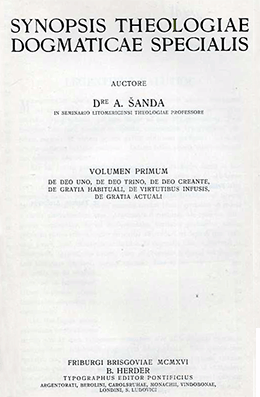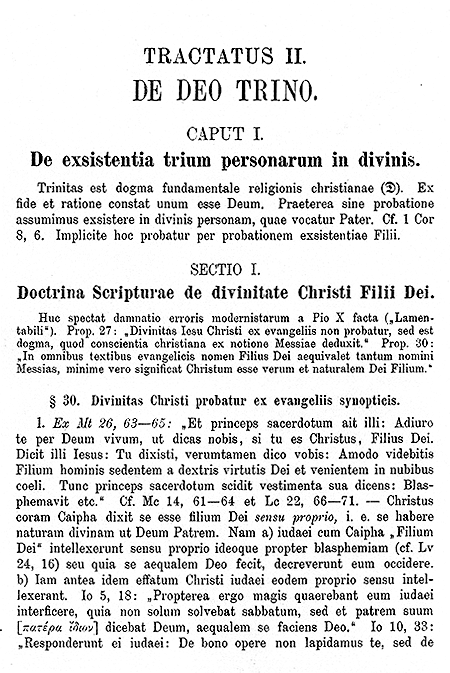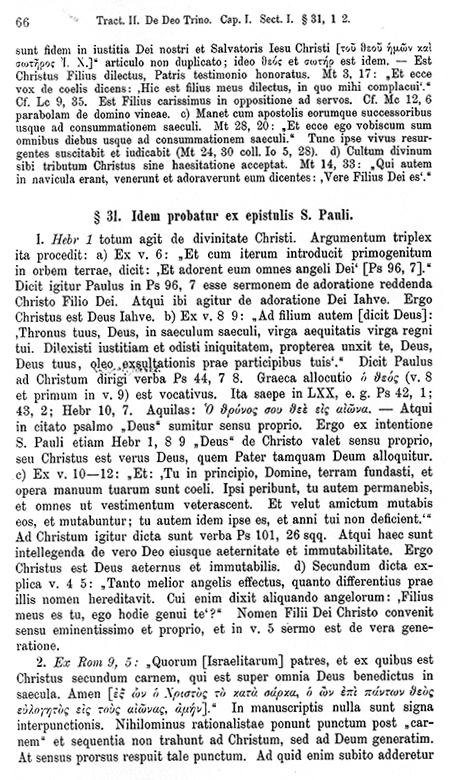SECOND TREATISE
On God the Triune

SECOND TREATISE
ON GOD THE TRIUNE
CHAPTER ONE
On the existence of three persons in God
Trinity is the fundamental dogma of the Christian religion. That there is one God is clear both from faith and reason. Besides, we assume without proof existence of a person in God which is called the Father. Cf. 1 Cor 8:6. This is proved implicitly by the proof of the existence of the existence of the Son.
SECTION ONE
Teaching of the Scripture
on the divinity of Christ the Son of God
To this applies the condemnation of the errors of the modernists by Pius X (“Lamentabili”). Prop. 27: “The divinity of Jesus Christ cannot be proved from the Gospels but is a dogma deduced by the Christian conscience from the notion of Messiah.” Prop. 30: “In all the Gospel texts the title ‘Son of God’ means only as much as ‘Messiah’ and does not signify at all that Christ is truly and physically Son of God.”
§ 30 Proof of the divinity of Christ from the synoptic Gospels.
(1) From Matthew 26, 63–65: The high priest said to him: “I charge you under oath by the living God: Tell us if you are the Christ, the Son of God.” “Yes, it is as you say,” Jesus replied. “But I say to all of you: In the future you will see the Son of Man sitting at the right hand of the Mighty One and coming on the clouds of heaven.” Then the high priest tore his clothes and said, ‘He has spoken blasphemy! Why do we need any more witnesses? Look, now you have heard the blasphemy.” Cf. Mark 14, 61–64 and Luke 22, 66–71.
Christ before Caiaphas said that he is Son of God in the proper sense, i.e. that he has divine nature like God the Father. For: a) The Jews including Caiaphas understood “Son of God” in the proper sense, which was the reason why they decided to kill him: because of blasphemy or because he posed himself as equal to God. b) The Jews had understood the same statement of Christ in the very same proper sense even before: John 5, 18: For this reason the Jews tried all the harder to kill him; not only was he breaking the Sabbath, but he was even calling God his own Father, making himself equal with God. John 10, 33: “We are not stoning you for any of these,” replied the Jews, “but for blasphemy, because you, a mere man, claim to be God.”
Now consider that Jesus has died for the truth of this testimony. So he was either a liar, or a fool, or he spoke the truth. But he was not a liar, as that is incompatible with his sanctity and miralces, neither a fool, as that is incompatible with his wisdom and miracles. Therefore he spoke truth and was a Son of God in the proper sense, having a divine nature communicated to him by God by true generation, which means that he was truly God.
(2) From Matthew 3, 3: This (John the Baptist) is he who was spoken of through the prophet Isaiah: “A voice of one calling in the desert: ‘Prepare the way for the Lord, make straight paths for him.’” Cf. Mark 1, 3 and Luke 3, 4.
The synoptics say that John the Baptist is the one to whom the words of Isaiah 40, 3 apply (at least typically, if not literally). But in that text Isaiah introduces a herald in the desert preceding God Yahveh who leads the people back from the babylonian captivity. Therefore according to the synoptics John the Baptist is a precursor of God Yahveh. But John the Baptisty is the precursor of Christ. Hence Christ is God Yahveh. Therefore John himself (John 1, 23) applies this verse to himself. The force of this argument cannot be eluded by saying that the text Isaiah 40, 3 does not apply typically to John the Baptist but is merely accomodated to him, for neither John nor the synoptics would have been justified to make such an acocomodation, had not Christ been true God.


